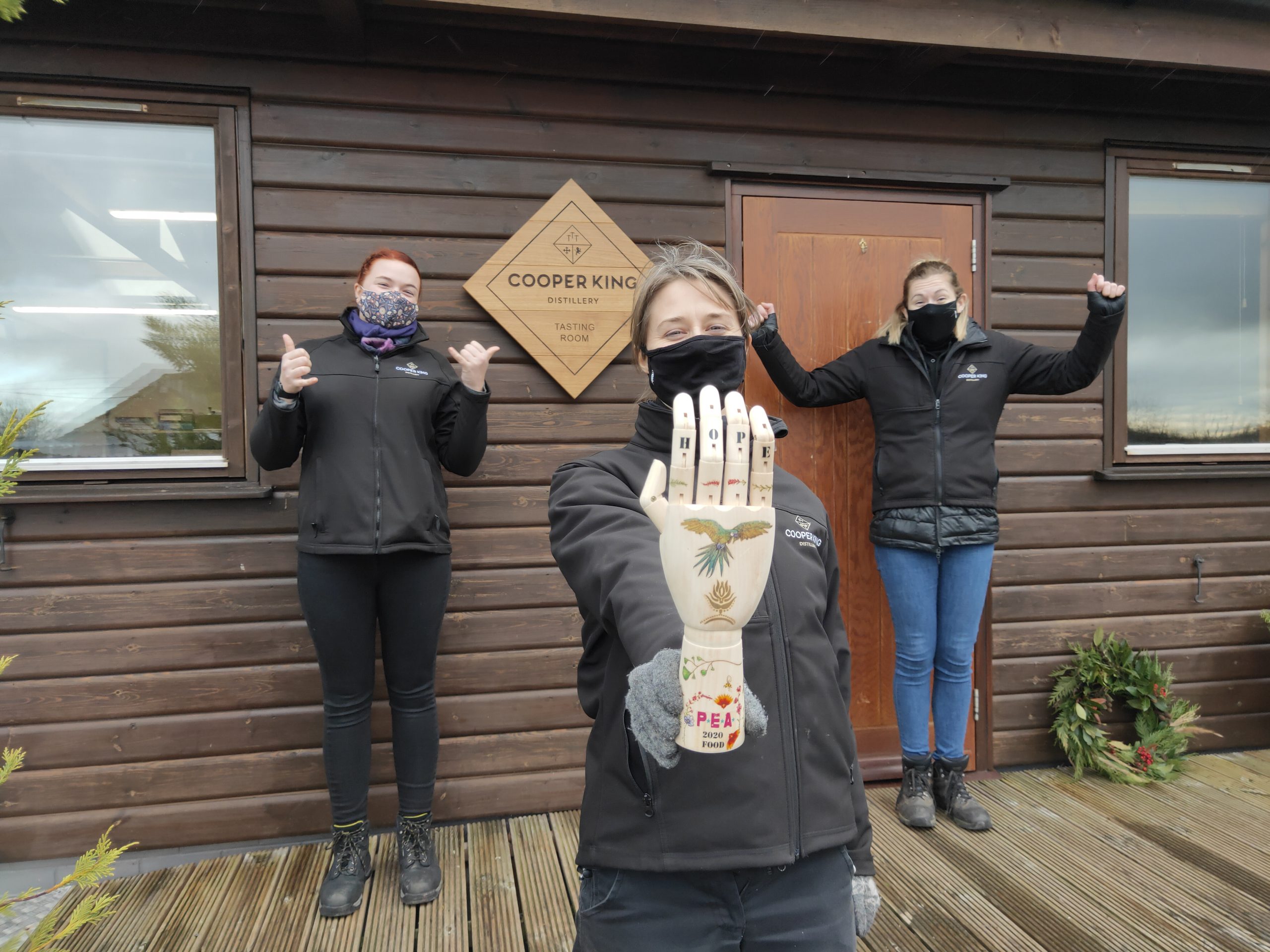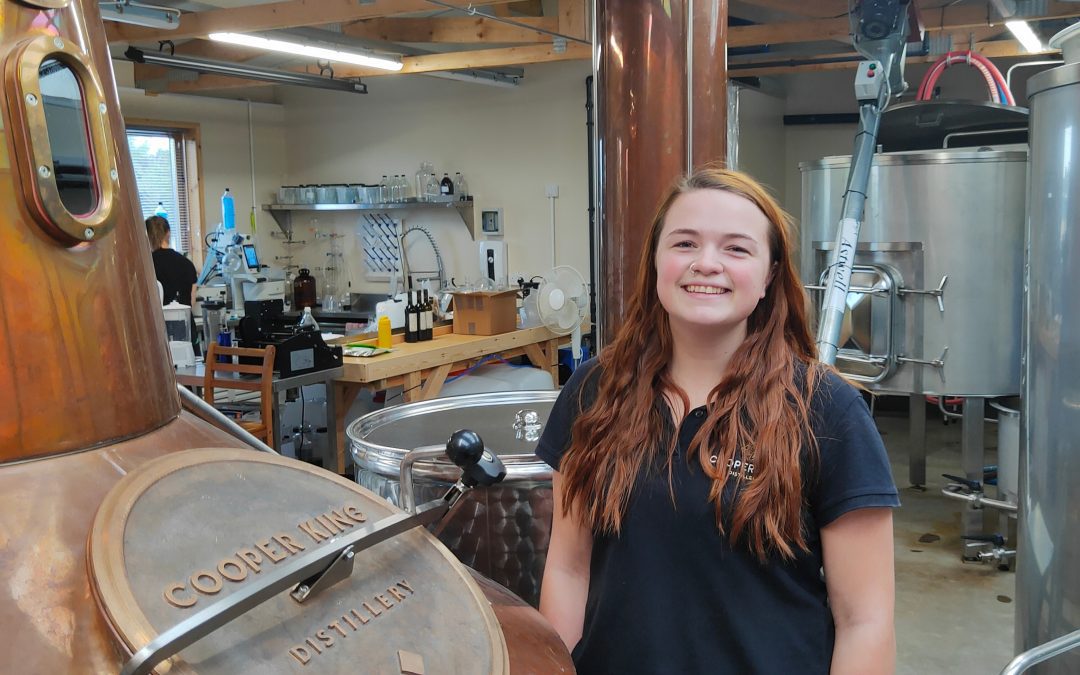
This post sponsored by Kelley Construction
Find Upcoming Bourbon Women Events Here
The Bourbon Women don’t just love bourbon, we also love other distilled spirits including Irish Whiskey! And above all else, we love to support the women around the globe who are making distilled spirits, like Sophie Pashley, Assistant Distiller at Cooper King Distillery in England, where they are making sustainably-produced gin and malt whiskeys.
BW: How did you find yourself working in a distillery?
SP: It’s been a 5-year journey. At 19 I started work at a wine and spirits merchants – The Wright Wine Company in Skipton – near where I grew up. It was during my time there where my eyes were truly opened to the incredible variety of wines and spirits out there. A year later I sat my first WSET (Wine and Spirit Education Trust) Level 2 Wines & Spirits exam, then a year after that I sat the more specialised WSET Level 2 Spirits Production.
After gaining a wealth of knowledge there came a tipping point: I wanted hands-on experience. I decided to email every distillery, brewery and vineyard within an hour’s drive of York, asking for voluntary or part-time work.
Skip forward 18 months, a lot of hard work, a few helpful friends and family, a healthy portion of volunteering, a WSET Level 3 Spirits qualification and a good pinch of luck and here I am, an Assistant Brewer & Distiller at Cooper King Distillery and living my dream!
BW: What does your typical working day look like?
SP: As Cooper King is such a small team, every day is different! On any one day I could be distilling or bottling gin, monitoring barrels or distilling whisky. My favourite day would be Thursday, our Brew and Wash run day. Brew day starts by mashing in by hand, using 100% floor-malted Yorkshire Maris Otter Barley from Warminster Maltings. We use 250 kilos of grain, to create a 1200 litre brew. We distil the wash after a week-long fermentation, hence our Brew days are also our Wash run days. It’s probably the most exciting, labour intensive, exhausting day I have, and I absolutely adore it. Running both the still and creating a brew single-handedly never gets boring! I’m constantly on my toes as we’re always experimenting with mash temperatures, sparging rates, yeast pitching temperature and distillation cut points, to extract the best possible character from our heritage barley.
Brewing and distilling an agricultural product such as grain, in a way that embraces climate fluctuations (minimal temperature control throughout fermentation and maturation), makes us intimately aware of the effect of man-made climate change. It presents additional challenges to me as the distiller but brings me closer to the growers and people trying to reverse the ecological crisis.
To put our production scale into perspective, we distil enough spirit on Neilson, our 900-litre Tasmanian copper pot still (the only one of its kind in the northern hemisphere), to fill one 100 litre cask a week. This equates to 3000 LPA (litres of pure alcohol) a year, whereas Macallan produces 15million LPA!
Regardless of size, from the outset, we have been intensely focused on producing flavourful spirit from traceable ingredients with a small environmental impact.
BW: What can distilling companies do to better support women in their ranks?
SP: As a woman in the industry, I have personally faced some huge barriers. I have been turned down from jobs, as I was told it would be too physically demanding, or that I didn’t ‘fit the bill’. I honestly believe that with the appropriate support, equipment and technique, anyone can do it.
Creating a more flexible working environment for family life would be a big positive. This could be achieved with fair company policies around flexitime to accommodate childcare, or shared parental leave.
Something a little closer to heart would be offering emotional support in the workplace. To create a safe, healthy, inclusive environment, emotional support from peers and management is crucial. All of the points I’ve mentioned aren’t just explicitly for women, they are for anyone within every industry.
One of the biggest industry-wide issues to tackle is the mindful use of language used in marketing. This was summed up brilliantly by Becky Paskin in a recent interview: “Whisky brands have the power to normalise the fact women make and drink whisky, by what they choose to show in their advertising and marketing. They don’t need to feminise their brands, but by simply being more inclusive they can change the narrative and appeal to a wider demographic of potential customers, which has obvious business benefits as well.”
It can’t be said clearer than that.
BW: What advice do you have for women who want to become distillers?
SP: Regardless of age, gender, ethnicity, race, religion, sexual orientation or any other social or personal characteristics, everyone should have the opportunity to work in an industry we love.
There are a few things I’d suggest. Firstly, try Tweet tastings. Twitter is one of the main ways I managed to taste such a wide spectrum of whisky, and was able to speak directly with the producers. Secondly, volunteer: there is no better way of opening doors than meeting people face to face.
Finally, if you’d like to gain in-depth knowledge of the spirits industry or want to further appreciate what you’re drinking, approach the WSET. Their teachers’ knowledge and passion is highly intoxicating and I’m sure you’ll be absolutely hooked!
BW: Tell me about your perfect whiskey weekend in York, England.
SP: I’m going to bend the rules slightly, by venturing outside of the city walls and bringing a few friends along… My day would start with a trip to Alastair Simms in Ripon, one of the last remaining Master Coopers in England. I’d go see what’s keeping him busy, nose any new interesting casks he had in and ask a million questions about being a cooper.
In the afternoon I’d make my way to York via the Tipsy Fox Off License in Easingwold – they always have some hidden gems in there – and grab a few beers to make the perfect boilermaker. The next stop would be a trip into work for a distillery tour and a cracking New-Make cocktail made by my colleague Laura.
After that I’d head into the city for an early dinner at Tommy Banks’ restaurant Roots (the first in York with a Michelin star), enjoy a few after-dinner whisky cocktails in Sotano’s, then I’ll spend the rest of the evening in The Habit. There are so many incredible independent venues in York, it’s always difficult to choose where to visit! The Habit has been my favourite place to grab a dram; it has brilliant live musicians, a cosy vibe and a cracking selection of whiskies.

Photos Courtesy of Cooper King Distillery

